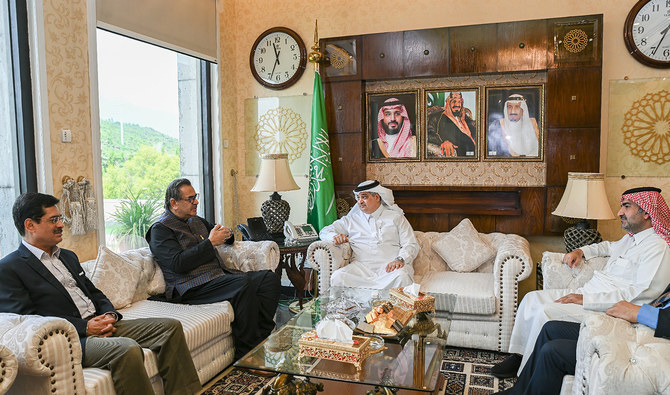ISLAMABAD: Saudi Minister for Hajj and Umrah, Dr. Tawfig Al-Rabiah, is set to visit Pakistan in the coming week to discuss matters concerning pilgrimage to Makkah and the promotion of religious tourism between the two countries, said an official statement circulated in Islamabad on Saturday.
The statement was issued after a meeting between Pakistan’s caretaker religious affairs minister, Aneeq Ahmed, and the kingdom’s envoy to Pakistan, Nawaf bin Said Al-Malki, ahead of the Saudi delegation visit.
“The Saudi delegation will engage in discussions regarding Hajj, Umrah, the Makkah Route initiative, and the promotion of religious tourism,” the statement informed.
“Memoranda of understanding (MoUs) will also be signed to enhance future Hajj arrangements during the delegation’s visit,” it added.
Ahmed said during the meeting that the Saudi official’s visit would hold “immense significance” for Pakistan, given his role as the chairman of the managing authority of Masjid al-Haram and Masjid al-Nabawi.
In response, Ambassador Al-Malki noted the relationship between Saudi Arabia and Pakistan had always been of great importance to the kingdom and its top leaders.
In a separate development, the Saudi envoy met with Pakistan’s caretaker interior minister, Sarfraz Ahmed Bugti, on Saturday to deliberate on the Pakistan-Saudi relations. Bugti lauded Al-Malki’s efforts to bolster bilateral ties between the two nations.
Saudi Arabia and Pakistan share strong relations encompassing cultural, religious, economic, and historical dimensions.
In 2019, Saudi Arabia introduced the Makkah Route Initiative in Pakistan and four other countries, streamlining Hajj pilgrims’ visas, customs, and health requirements at their departure airports, thus saving them substantial time upon arrival in the kingdom.
Saudi Arabia is also home to over 2.5 million Pakistani expatriates and plays a pivotal role in providing remittances and oil supplies to the South Asian country.
In June of this year, Saudi Arabia extended assistance to Pakistan by depositing $3 billion in its central bank, helping Islamabad avert a sovereign default and secure an International Monetary Fund (IMF) bailout deal.


















